With the end of the rainy season and summer temperatures, I took the opportunity in recent days, to achieve different outings in different habitats at different altitudes.
My picking morels have been abundant, I could walk from my mind quiet and curious.
Rather than offer my outings one by one, I gather my finds by theme, except for my walk at high altitude.
First, a word about the biotopes: I realized an output at 700m altitude in a wooded area of Vosges forest and pasture area.
I also made an exit to an area in valley with riverside woodland, groves and pastures at an altitude of 400m and I finally made an exit in a plain area which consists of forest, groves and pastures.
First finds in the family of Morchellaceae: I expected them in my biotope #4, but nothing came out.
It is in a riverside woodland that I was lucky enough to find them.
I had already shown you a small bell morel found during my outing from April 22.
This time I found a preserved area where they could reach large sizes or atypical forms.
On the left picture, you can perfectly see the insertion of the stipe at the top of the cap, typical for bell morels or early false morel, unlike the morel, whose cap is inserted from the bottom of the stipe, either directly as morels esculenta group, either by a thin membrane, in the group of elata, which is seen in section in the right picture. Meanwhile, the half-tree morel has an insertion of the stipe halfway up into the cap.
In this area without picking, the bell morels reach large sizes!
I also found bell morel with atypical appearance, whose cap is significantly cervelliforme and the insertion of the stipe which is made by a kind of thin membrane. Although this is probably also bell morels, I collected one to make a complete microscopic study.
My picking morels have been abundant, I could walk from my mind quiet and curious.
Rather than offer my outings one by one, I gather my finds by theme, except for my walk at high altitude.
First, a word about the biotopes: I realized an output at 700m altitude in a wooded area of Vosges forest and pasture area.
I also made an exit to an area in valley with riverside woodland, groves and pastures at an altitude of 400m and I finally made an exit in a plain area which consists of forest, groves and pastures.
First finds in the family of Morchellaceae: I expected them in my biotope #4, but nothing came out.
It is in a riverside woodland that I was lucky enough to find them.
I had already shown you a small bell morel found during my outing from April 22.
This time I found a preserved area where they could reach large sizes or atypical forms.
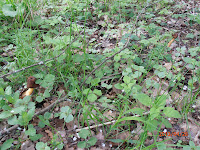 |
| Bell morels. |
 |
| Bell morels. |
On the left picture, you can perfectly see the insertion of the stipe at the top of the cap, typical for bell morels or early false morel, unlike the morel, whose cap is inserted from the bottom of the stipe, either directly as morels esculenta group, either by a thin membrane, in the group of elata, which is seen in section in the right picture. Meanwhile, the half-tree morel has an insertion of the stipe halfway up into the cap.
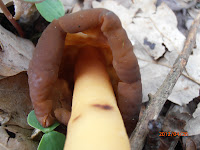 |
| Typical insertion of the stipe for bell morel. |
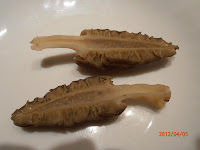 |
| Typical insertion of the stipe for morel. |
 |
| A thin membrane for "elata". |
 |
| No thin membrane for the "esculenta" |
In this area without picking, the bell morels reach large sizes!
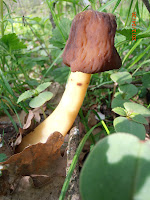 |
| A record size! |
 |
| About 17 cm for this one. |
I also found bell morel with atypical appearance, whose cap is significantly cervelliforme and the insertion of the stipe which is made by a kind of thin membrane. Although this is probably also bell morels, I collected one to make a complete microscopic study.
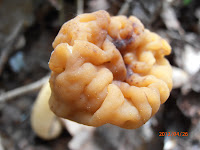 |
| Cervelliforme cap. |
 |
| Atypical stipe insertion. |
No comments:
Post a Comment
Thank you for participating !